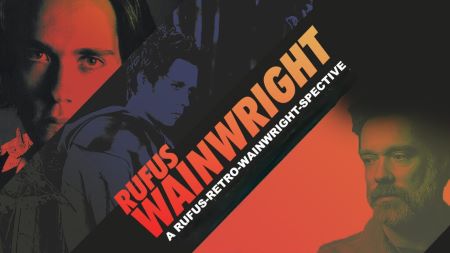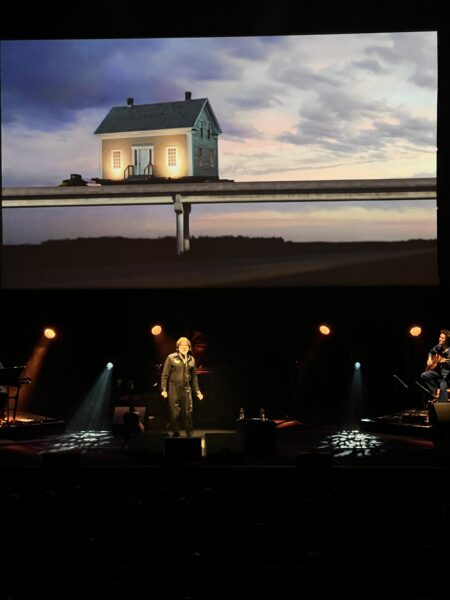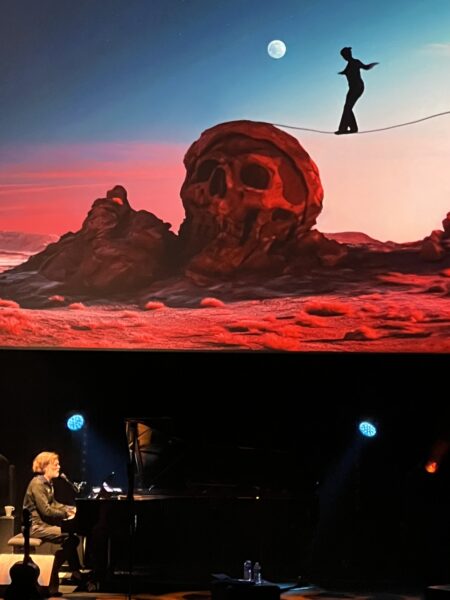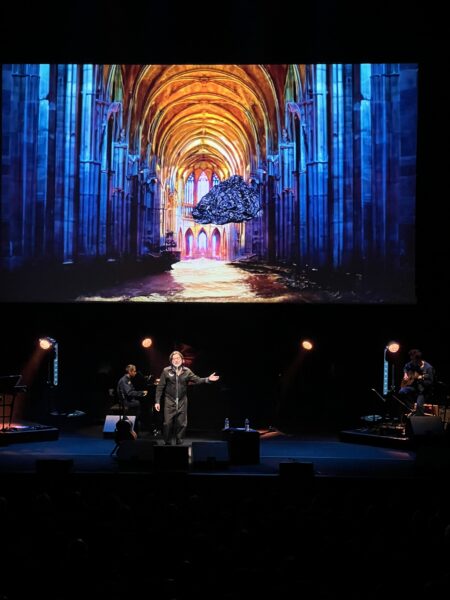A RUFUS CONVERT
During Rufus Wainwright‘s homey, intimate concert last night at the packed 500-seat theater at The Wallis in Beverly Hills, he chuckled that he didn’t really want to do A Rufus-Retro-Wainwright-Spective again. Constantly appearing in different shows, he noted that the three-night engagement here was “a lot.” And he ain’t kiddin’. Over three nights, he’s performing about 70 songs — some written in his teens, most written here in L.A., a few by other writers — which are done coffee-house style with no orchestra, no quintessentially Rufus arrangements, and no back-up vocals. Just Rufus with returning pianist Jacob Mann and guitarist Josh Mease accompanying him. And there’s one more artist involved: Italian painter and media artist Gioele Amaro, who made art videos to accompany each song.
Rufus Wainwright at The Wallis, Oct 30
What Rufus didn’t mention was the genesis of this wonderfully special event — maybe because his attending family and fans already knew. At the start of the COVID-19 lock down in March 2019, Rufus performed a song each day for his Instagram Followers. The daily “Quarantunes” were beamed from the living room of his Laurel Canyon home here in Los Angeles which earned him a global following. Thus, he created A Rufus-Retro-Wainwright-Spective, a series of 20 live-streamed concerts with his guitar player Brian Green and Jacob Mann, going through his entire studio album song catalog in chronological order. And, as is usually the case with Rufus shows, there were sometimes special guests of phenomenal fame.
Now, the Rufus-Retro-Wainwright-Spective is being performed live, most likely for the last time.
Rufus still concentrates on his studio albums, but has arranged the songs in three thematically different structures playing over three nights through Saturday (the show, which premiered in October 2023 at the Philharmonie in Paris, was supposed to be a one-off). Act I, which I attended last night, is Songs of Youth and Addiction; Act II, Songs of Love and Desire will play Friday Nov 1; and Act III, Songs of Contempt and Resistance, plays Saturday Nov 2.
But for a busy guy, the first thing that struck me was his phenomenal vocals. At 51, Rufus’s very distinctive tenor remains edgy but open-throated, expressive but woody — a timeless youthful sound born of folk musician Loudon Wainwright III and Canadian singer and composer Kate McGarrigle (his sister, folk-rock singer-songwriter Martha was in the house). It sounds like he’s been partying (which he wasn’t) but can submit a clear falsetto in a soothing but slightly scratchy vibrato. Whether accompanying himself center stage on guitar and upstage on the piano, or soloing while the cool and soft duo played behind him, Rufus’s voice completely wrapped itself around us.
Much of the background info I offer was clearly not needed for attendees at The Wallis, most of whom, when asked, had never even been to this awesome mid-size house, one of the best in L.A. And it was by far the most well-behaved crowd in memory. Reverent but relaxed, there were no “Woo-Hoo’s” or demonstrative cooing; it felt like these were friends (and some actually were) with their pal in his living room. Hell, after watching Rufus in an extended set for the first time, I wanted to be his friend. All that was missing was being blanketed and sipping Chardonnay. Indeed, when I got home and re-listened to the same songs as originally recorded, I thought, Great orchestrations, great vocals, but I’m sad to not be back at The Wallis. He even accompanied himself for one tune on his mother’s guitar, something he’s never done in public. And, as if we were in his home, he gave up trying to tune it and handed it to “the straight guy” Mease.
Most, if not all, of the song choices were familiar to viewers, who offered gentle applause of recognition. Eclectic, emotional, heartfelt, and very jocular (“There’s a microphone on my penis”; “Buy merch…it’s like a hazard [for me]”), he began the 21-songs — almost half of which come from his Want albums — with “Cigarettes and Chocolate Milk” (from his 2001 Poses) a song which elucidates his genius for melodic lyricism. I love the way he mashes up folk and Kurt Weill-esque Broadway into what can be best described as pop-arias. He mentioned he’s a fanatic about opera (he’s written two), and that his first musical Opening Night debuted in London’s West End last March. From that show, he sang “This Isn’t A Game Anymore”. This number from a fed-up ghost fascinated me, sort of alt-rock with a beguine rhythm that would suddenly turn to soliloquy. I loved it here, but for a musical it would come off bemusingly hookless and scattered. (I’m champing at the bit to hear the soon-to-be cast album.)
I must admit that his poetic lyrics can be somewhat esoteric, better-suited for a poetry jam than to be put to music. Before this concert, I admit I just didn’t get it (even he was self-deprecating at the prosaic lyrics of one song written long ago). Yet — even as he still under-enunciates some words — watching him live during the haunting, ephemeral, and primal “Beautiful Child”, written, he tells us, on acid at Yoko Ono’s farm after 9/11, enraptured me. I used to sideline his work, but now, as Gunnery Sergeant Hartman said in Full Metal Jacket, I’m born-again hard.
Gioele Amaro’s art videos, many with water or clouds, were extraordinary. For “Imagining Love”, there was a Monty Python-esque castle floating over mountains; “Early Morning Madness” spliced together many romantic movie couplings (East of Eden‘s Julie Harris and James Dean <sigh>), but obliterated faces and body images with iPhone-like scrawls; “Gay Messiah” had us closing in ever so slowly towards the schmeckle on Michelangelo’s David; “Barcelona” had neon-outlined flowers folding and unfolding; during “Natasha” (I think) there was a giant floating rock inside a church as waves from the sea kept pouring in inundating the floor; and one of Rufus’s most theatrical ballads, the gorgeous, sorrowful “Memphis Skyline”, written as a tribute to Jeff Buckley, had a flatbed truck hauling a beautiful, well-lit home very very slowly on a bridge over, I assume, the Mississippi river’s Wolf River Harbor, where Buckley went swimming, fully dressed, and drowned just a few months after he met with Rufus, who had been harboring years of resentment and jealousy. The enigmatic image suited the enigmatic lyrics. Amaro is indeed, as Rufus said. a very cool Italian guy.
When he announced he was doing a Leonard Cohen tune for his encore, he added it wouldn’t be his well-known take on “Hallelujah”, which he said, “has been done enough” — clearly referencing a recent Town Hall gathering in which Trump swayed to the tune, adding “Great song”. Cohen’s witty lyric, “You told me again you preferred handsome men, but for me you would make an exception” in “Chelsea Hotel No. 2” was made even more humorous by the fact that Rufus, now with a slight paunch, is beyond way sexy, adorable like a cuddly bear (especially during the spy-theme ’60s sounding “In With the Ladies”), abandoning his erstwhile grey beard for tiny lamb-chop sideburns and moustache, dressed (as were his two bandmates) in a mechanic-chic “working outfit” with a large red, bejeweled, beetle brooch on his chest that I originally mistook for a red AIDS ribbon.
I now understand that his oeuvre is made up of songs that you lean into, they don’t come to you. It makes sense that he is not only regarded as one of Elton John’s favorite musicians, but has captured the hearts of those who also find life challenging, messy and oh so beautiful.
photos of the Philharmonie concert with artwork Gioele Amaro by Jorn Weisbrodt
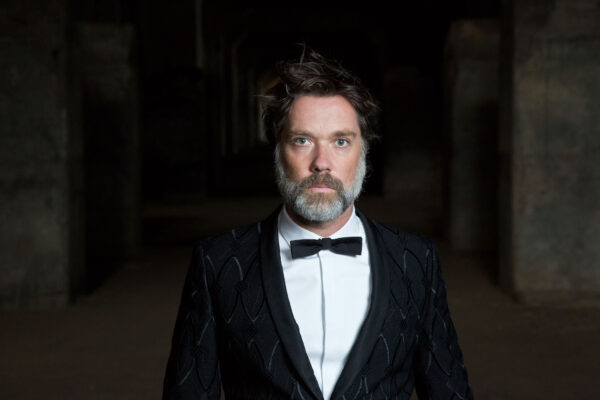
Rufus Wainwright now (photo V. Tony Hauser) and then (Want Two photo by Andy Earl)
A Rufus-Retro-Wainwright-Spective
Wallis Annenberg Center for the Performing Arts
9390 N. Santa Monica Blvd. in Beverly Hills
ACT 1: Songs of Youth and Addiction played Oct 30, 2024
ACT 2: Songs of Love and Desire plays Nov. 1 at 7:30
ACT 3: Songs of Contempt and Resistance plays Nov. 2 at 7:30
for tickets (starting at $79), call 310.2463800 or visit The Wallis
for future Rufus engagements, visit Rufus
ACT 1: Songs of Youth and Addiction — Wainwright debuted his first album at the age of 25. His songwriting goes back more than a decade before that. He has been outspoken about his struggle with addiction to drugs and alcohol but ultimately his addiction to life and his art and music has been greater and prevented him from a darker fate. Addiction is an expression of obsession and Wainwright harbors many an obsession that shows up throughout his entire catalogue: with love, with men, with opera, with Hollywood’s Golden Period, or with chocolate. It is these obsessions that are fuel for his searching as an artist.
ACT 1 Set List at The Wallis
“Cigarettes and Chocolate Milk” (Poses)
“Barcelona” (Rufus Wainwright)
“In with the Ladies” (Want)
“Damned Ladies” (Want)
“Vicious World” (Want One)
“Natasha” (Want One)
“Matinee Idol” (Rufus Wainwright)
“Early Morning Madness” (Unfollow the Rules)
“Memphis Skyline” (Want Two)
“A Bit of You” (Rufus Wainwright Retrospective)
“Hometown Waltz” (Want Two)
“Sally Ann” (Rufus Wainwright)
“Gay Messiah” (Want Two)
“Between My Legs” (Release the Stars)
“Beautiful Child” (Want One)
“Perfect Man” (Out of the Game)
“This Isn’t A Game Anymore” (from the musical, Opening Night)
“11:11” (Want One)
“Imaginary Love” (Rufus Wainwright)
“Poses” (Poses)
Encore: “Chelsea Hotel No. 2” (written by Leonard Cohen)
ACT 2: Songs of Love and Desire — When obsessions lose their edge, the true nature of feelings gets revealed. Obsessions are what drives an artist forward, that makes them leave their homes to find new unchartered territory and ultimately new homes. But the places they are looking for are the safe places from obsessions, the harbors of love and other fulfilling desires. Wainwright’s songs over and over again find these moments of happiness, in his love life, his family life as a father, as a son or as a friend. These are great moments of peace, of being aligned with yourself and your world that he expresses in his unique melodies and lyrics.
ACT 3: Songs of Contempt and Resistance — Any highly original artist is going to find resistance from the outside world against their work and if they want to be successful, will have to put up a fight for their position in the world. He will also fight himself, his doubts and demons. These fights can be political, artistic, or personal. Exuberant as Wainwright is in his song-writing, these feelings fuel some of his most epic songs and lyrics from Old Testament references in “Jericho” to symphonic climaxes in “Go or Go Ahead”. But as in all of Wainwright’s songs, there is a joy and irony in what he is expressing, a lust for the art of songwriting that lifts these personal struggles into a much higher plain of human experience.
